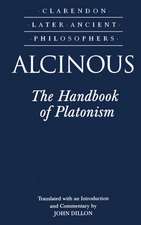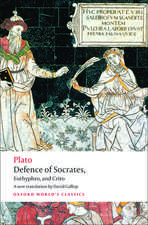Well-Being: Happiness in a Worthwhile Life
Autor Neera K. Badhwaren Limba Engleză Paperback – 25 mai 2017
| Toate formatele și edițiile | Preț | Express |
|---|---|---|
| Paperback (1) | 231.83 lei 31-38 zile | |
| Oxford University Press – 25 mai 2017 | 231.83 lei 31-38 zile | |
| Hardback (1) | 528.40 lei 31-38 zile | |
| Oxford University Press – 24 iul 2014 | 528.40 lei 31-38 zile |
Preț: 231.83 lei
Preț vechi: 262.32 lei
-12% Nou
Puncte Express: 348
Preț estimativ în valută:
44.36€ • 47.44$ • 36.99£
44.36€ • 47.44$ • 36.99£
Carte tipărită la comandă
Livrare economică 07-14 aprilie
Preluare comenzi: 021 569.72.76
Specificații
ISBN-13: 9780190682071
ISBN-10: 0190682078
Pagini: 260
Dimensiuni: 231 x 155 x 18 mm
Greutate: 0.36 kg
Editura: Oxford University Press
Colecția OUP USA
Locul publicării:New York, United States
ISBN-10: 0190682078
Pagini: 260
Dimensiuni: 231 x 155 x 18 mm
Greutate: 0.36 kg
Editura: Oxford University Press
Colecția OUP USA
Locul publicării:New York, United States
Recenzii
Badhwar's overall argument and her portrayal of the highest prudential good is powerful, rich, and worth serious consideration.
The renaissance of virtue ethics, in particular the rise of neo-Aristotelian virtue ethics, has greatly stimulated renewed reflection on the concepts of happiness and well-being, on the relations between prudential value and moral goodness, the instrumental and intrinsic value of the virtues, and so on. In this context, it is not easy to come up with something that is both original and convincing. Neera Badhwar's tightly argued Well-Being: Happiness in a Worthwhile Life goes a fair way towards being both...
This is an ambitious and important book. It manages to clear a commonsensical path through the non-commonsensical stretches of various eudaimonistic theories of virtue and happiness
[C]onsistently engaging, colorful, and intricately argued.
In addition to her incorporation of the philosophical literature, Badhwar shows how her thesis is complementary with ongoing research into experimental psychology. Her informed and nuanced treatment of the empirical evidence throughout the text is not simply philosophy playing 'catch-up' with science, or related to it in any superficial way. Rather, a great strength of the work is its ability to show how philosophy and empirical psychology can inform and support (and deeply criticize) one another.
Neera Badhwar has given us a rich, subtle and humane philosophical portrait of human flourishing, marrying the critical bite of Aristotelian theories with the subjective attractions of modern accounts, and providing an exceptionally thoughtful discussion of the significance of autonomy and reality-orientation for human well-being (Badhwar 2014). It is an important contribution to the debate regarding Aristotelian theories of well-being, which for my money are the most formidable of the traditional players in philosophical debates about well-being.
This wonderful book opens up the topics of well-being, happiness and virtue from fresh angles, and stimulates thinking about the relation of happiness to virtue, as well as the importance of circumstances and the nature of vice. Anyone interested in these topics should read this book.
The renaissance of virtue ethics, in particular the rise of neo-Aristotelian virtue ethics, has greatly stimulated renewed reflection on the concepts of happiness and well-being, on the relations between prudential value and moral goodness, the instrumental and intrinsic value of the virtues, and so on. In this context, it is not easy to come up with something that is both original and convincing. Neera Badhwar's tightly argued Well-Being: Happiness in a Worthwhile Life goes a fair way towards being both...
This is an ambitious and important book. It manages to clear a commonsensical path through the non-commonsensical stretches of various eudaimonistic theories of virtue and happiness
[C]onsistently engaging, colorful, and intricately argued.
In addition to her incorporation of the philosophical literature, Badhwar shows how her thesis is complementary with ongoing research into experimental psychology. Her informed and nuanced treatment of the empirical evidence throughout the text is not simply philosophy playing 'catch-up' with science, or related to it in any superficial way. Rather, a great strength of the work is its ability to show how philosophy and empirical psychology can inform and support (and deeply criticize) one another.
Neera Badhwar has given us a rich, subtle and humane philosophical portrait of human flourishing, marrying the critical bite of Aristotelian theories with the subjective attractions of modern accounts, and providing an exceptionally thoughtful discussion of the significance of autonomy and reality-orientation for human well-being (Badhwar 2014). It is an important contribution to the debate regarding Aristotelian theories of well-being, which for my money are the most formidable of the traditional players in philosophical debates about well-being.
This wonderful book opens up the topics of well-being, happiness and virtue from fresh angles, and stimulates thinking about the relation of happiness to virtue, as well as the importance of circumstances and the nature of vice. Anyone interested in these topics should read this book.
Notă biografică
Neera K. Badhwar is Professor Emerita of Philosophy at the University of Oklahoma and is affiliated with the Departments of Philosophy and Economics at George Mason University. She has published articles on friendship, virtue, self-interest, market societies, and other topics in ethics and social-political philosophy in such journals as Ethics, Journal of Philosophy, Nous, Philosophy and Phenomenological Research, Social Philosophy and Policy, and Politics, Philosophy & Economics. She is also the editor of Friendship: A Philosophical Reader (Cornell University Press).













